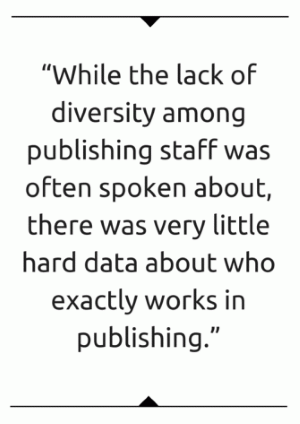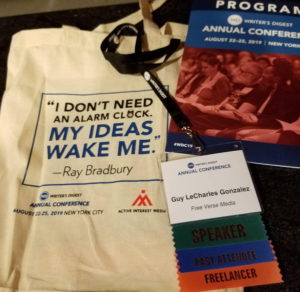‘‘And, for writers who are trying to challenge the pandering of the white gaze, if you have to go through a series of gatekeepers who are uniformly white, you’re going to end up with something that’s’’ — here came a considered pause — ‘‘it’s going to be tough to preserve the integrity in the end.’’
—“How Chris Jackson Is Building a Black Literary Movement”
Vinson Cunningham, THE NEW YORK TIMES
What’s the most exciting thing to happen in book publishing over the past several years? The rise of self-publishing? Coloring books for adults? Social commerce? (LOL!)
I’d argue that it’s the slow but steady maturation of the discussions around the industry’s disappointingly predictable lack of diversity, from staff to shelves.
@glecharles @LEEandLOW has always walked the walk of making diverse books for kids, watching them take the fight to the industry is v cool.
— Emily Williams (@emilyw00) February 8, 2016
WHERE IS THE DIVERSITY IN PUBLISHING?
The recently released results of the first Diversity Baseline Survey, spearheaded and championed by Jason Low and a small group of forward-thinking industry professionals (including my former colleagues at SLJ who walk the walk better than anyone I’ve ever worked with), weren’t terribly surprising: book publishing is predominantly straight, white, and female, with straight white men predictably making notable inroads at the executive level.

What was surprising, though, was how many publishers and review journals participated–34 and 8, respectively–and how the data is seemingly starting to drive more focused, more actionable discussions across the industry.
Not coincidentally, while this survey was being conducted, we saw a variety of relevant incidents over the past year or so that highlight publishing’s diversity problem, from Daniel Handler’s racist introduction of Jacqueline Woodson, to reader outrage over the inclusion of gay and lesbian characters in a beloved franchise, to happy, smiling slaves in childrens’ literature.
Notably, in the latter example, several of the people involved were black, an important reminder that being “committed to diversity” and hiring a few people of color isn’t some silver bullet.
And, of course, diversity isn’t simply about race, but it’s arguably the most glaring aspect of the industry’s challenges as systemic racism is embedded deeply in its DNA.
Throughout my 20+ years in publishing (mostly in the magazine world, but the past 6+ years have closely aligned with books) I’ve often been the only minority in a meeting, or one of just a few on staff. As I moved into management and started hiring my own staff, I was often frustrated by the lack of minority candidates I’d see, even when I’d proactively seek them out. And minority interns are the industry’s true unicorns, especially when the roles are unpaid, as they so often are.
As a result, my own professional network looks nothing like my personal network. It’s overwhelmingly white and I’ve often been stumped when asked to recommend minority candidates for jobs or conference panels or articles about publishing’s diversity problems.
It’s frustrating as hell, actually.
DIVERSITY IS REALITY
Diversity isn’t a trending topic.
Diversity isn’t about tolerance for “others” or being politically correct.
A “commitment to diversity” isn’t an initiative or a program with a start and end date.
Diversity is reality. Period.
It’s long past time the publishing industry came to grips with that reality, especially if its biggest players have any real expectations of being the “global industry” it thinks it is.
The $100,000 question, though, is what can I do to help change things?
If you’re white and work in publishing, the path to creating a more diverse industry that represents the real world is actually a lot clearer than it is for those who are underrepresented. You’re the default; you have access and influence and the ability to drive change from the inside. And thankfully, I know many who are doing exactly that and I appreciate their efforts.
But what about the rest of us? How can we help drive change in this industry we care so much about, despite it so often not caring all that much about us?
I often question why I work in/for an industry that doesn’t really value my existence or interests, so that Jackson profile is heartening.
— Guy L. Gonzalez (@glecharles) February 2, 2016
Is the only solution to do it all ourselves while a handful of exceptions slowly drive change from the inside, or is there a realistic, viable middle ground?
I’m asking for a friend.
Do you like email?
Sign up here to get my bi-weekly "newsletter" and/or receive every new blog post delivered right to your inbox. (Burner emails are fine. I get it!)




Guy,
Well said: “Diversity is reality.” I wonder if encouraging book bloggers or reviewers from diverse backgrounds would drive sales (eBooks, pBooks or subscriptions) to diverse readers. Increased sales of diverse media would clear the way for more to be produced since publishing is often profit-driven.
That’s definitely one angle, and something Book Riot and SLJ, in particular, are leading the way on. I think the bigger challenge is shifting the cultural mindset that defines “white” as the neutral default and everything else as “other.” The publishing industry (including booksellers) reflects that mindset, but they should be leading the charge to change it.